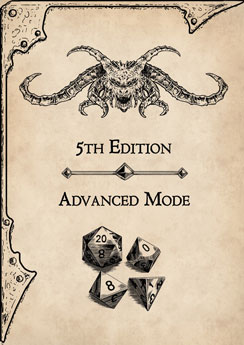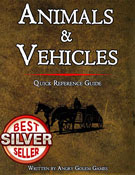Large celestial, lawful good
Armor Class 12
Hit Points 59 (7d10+21)
Speed 60 ft., fly 90 ft.
Proficiency Bonus +2
Proficiency Bonus +4 (5th Edition Advanced Mode)
| STR | DEX | CON | INT | WIS | CHA |
|---|---|---|---|---|---|
| 18 (+4) | 15 (+2) | 16 (+3) | 10 (+0) | 15 (+2) | 13 (+1) |
Saving Throws Dex +4, Wis +4, Cha +3
Skills Perception +6
Senses passive Perception 16
Languages understands celestial, common, elvish, and sylvan but can’t speak
Challenge 2 (450 XP)
Dive Attack (suggested). If the pegasus is flying and dives at least 50 feet straight toward a target and then hits it with its hooves, the attack deals double damage and has advantage. If the target is Large or smaller size, it must succeed a DC 12 Strength saving throw or be knocked prone.
Innate Spellcasting (suggested). The pegasus’ innate spellcasting ability is Wisdom (spell save DC 12). The pegasus can innately cast the following spells, requiring no material components:
- At will: Detect Evil and Good
ACTIONS
- Multiattack (suggested). The pegasus makes three attacks, one with its bite and two with its hooves or two attacks with its rear hooves against a rear target.
- Bite (suggested). Melee Weapon Attack: +6 to hit, reach 5 ft., one target. Hit: 6 (1d4 + 4) bludgeoning damage.
- Hooves. Melee Weapon Attack: +6 to hit, reach 5 ft., one target. Hit: 11 (2d6 + 4) bludgeoning damage.
- Hooves (suggested). Melee Weapon Attack: +6 to hit, reach 5 ft., one target. Hit: 8 (1d8 + 4) bludgeoning damage.
- Rear Hooves (suggested). Melee Weapon Attack: +6 to hit, reach 10 ft., one target. Hit: 11 (2d6 + 4) bludgeoning damage.
5th Edition Advanced Mode
Limiting the power of a character and making the overall difficulty of the game harder, does not reduce the creativity, indeed it does quite the opposite.
The Game Master has the option to use any and all of the instances proposed in this guide, or just some of them according to their preference.
It is the lack of something that move and motivate characters, not the abundance of it
DESCRIPTION
A pegasus is a magnificent winged horse that can soar through the skies with grace and majesty. It has a coat of pure white fur, a mane and tail of white feathers, and large feathered wings that span about 20 feet. Its eyes are intelligent and kind, and it can understand several languages, though it cannot speak. A pegasus is a celestial creature, meaning it has a connection to the higher planes of existence and serves a good cause.
A pegasus is very shy and wild, not easily tamed. It will only serve as a mount for a good-natured humanoid who shares its ideals and treats it with respect. A pegasus can sense the alignment of other creatures, allowing it to detect evil or good intentions. A pegasus must be ridden bareback; it will not accept saddles.
COMBAT
A pegasus prefers to avoid combat if possible, using its speed and agility to evade its enemies or lead them on a wild chase. However, if threatened or defending its mate or offspring, a pegasus can be a fierce opponent. It can strike with its powerful hooves or bite with its teeth, and it can also use its wings to create gusts of wind or shield itself from attacks.
In battle, a pegasus will try to lure larger opponents (such as dragons) into tight spaces. As the opponent struggles to maneuver into attack range, the pegasus climbs and attacks with its hooves from above. Against creatures their own size, such as griffons, pegasi use their superior speed to outrun them. If griffons are close to a pegasus nest (especially if there are young present), one parent will attack aggressively, get the griffon’s attention, and then fly away. By doing this, they hope to lure enemies away from the nest and tire them out over a long distance before returning home.
HABITAT / SOCIETY
A pegasus lives in temperate or subtropical forests, hills, or plains, where it can find plenty of vegetation and fresh water. It is a solitary creature, except when it mates or raises its young. A pegasus mates for life, and the pair builds a nest high in the trees or on a mountain ledge. A female pegasus gives birth to one foal every two years, and the parents care for it until it is old enough to fly on its own. A greater pegasus is a rare variant with enhanced abilities and intelligence.
Pegasi are intelligent creatures that often serve the cause of good. They are revered by many good-aligned races, such as elves, gnomes, halflings, and humans, who see them as a symbol of beauty, freedom, and goodness. To tame a pegasus, a person of good alignment must locate a pegasus herd. Then, at night, he can try to sneak up on a pegasus and surprise it with a magical bridle enchanted for the purpose. A tamed pegasus will obey the commands of its master for as long as it lives, if the master remains of good alignment.
ECOLOGY
A pegasus is an herbivore, feeding on grasses, fruits, nuts, and flowers. It does not harm other living creatures unless provoked or defending itself. Griffons and hippogriffs are the natural enemies of a pegasus. Pegasi may also be sought after by wizards or clerics who wish to use their blood or heart for magical purposes.
Pegasus is employed as material component to empower the following spells:
Pegasi can be used as mounts or pulling animals for vehicles.
The statistics are detailed in the D&D 5e Animals & Vehicles reference guide. Just have a look at the preview on DrivethruRpg.

